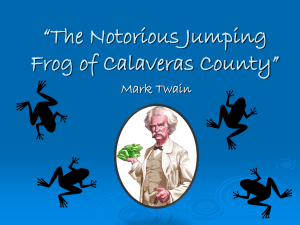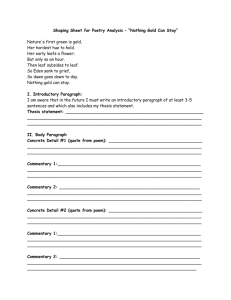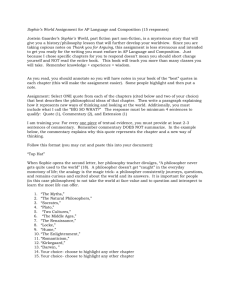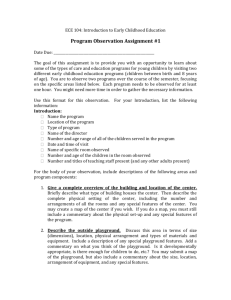Archetypes of wisdom
advertisement
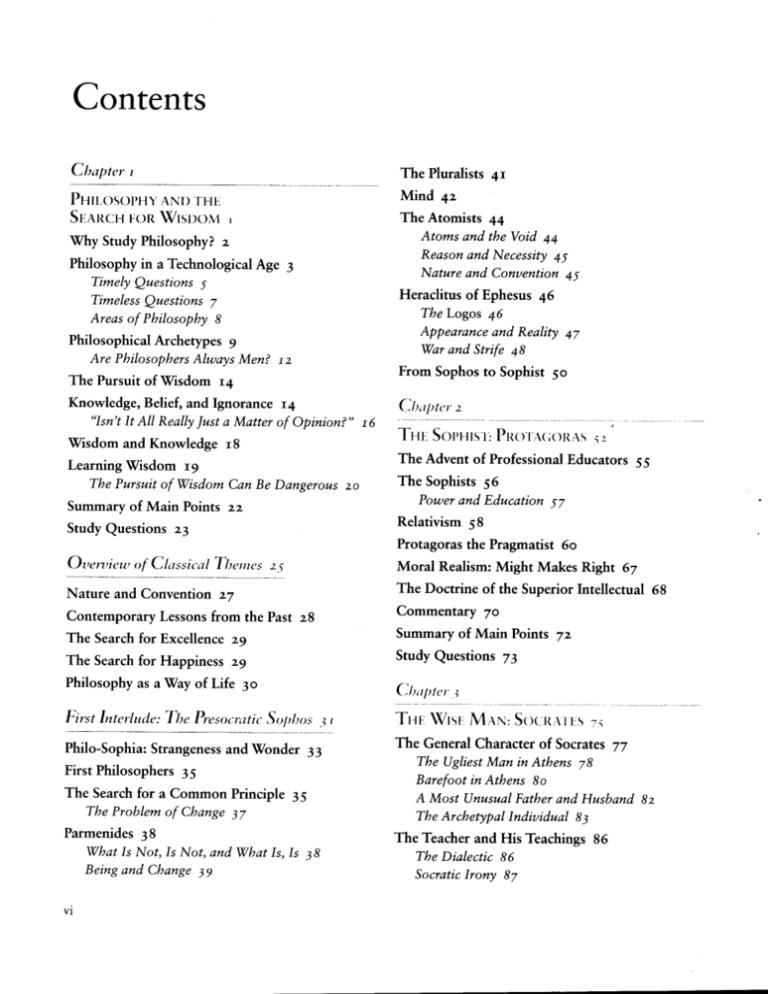
Contents
Chapter
The Pluralists 41
I
-~~-~--------.---
Mind
PHILOSOPHY AND THE
SEARCH FOR WISDOM
Why Study Philosophy?
The Atomists 44
Atoms and the Void 44
Reason and Necessity 45
Nature and Convention 45
I
2
Philosophy in a Technological Age 3
Timely Questions 5
Timeless Questions 7
Areas of Philosophy 8
Philosophical Archetypes 9
Are Philosophers Always Men?
Heraclitus of Ephesus 46
The Logos 46
Appearance and Reality 47
War and Strife 48
I2
From Sophos to Sophist 50
The Pursuit of Wisdom 14
Knowledge, Belief, and Ignorance 14
"Isn't It All Really Just a Matter of Opinion?" I6
Wisdom and Knowledge 18
Learning Wisdom 19
The Pursuit of Wisdom Can Be Dangerous
Summary of Main Points
42
22
Study Questions 23
Chal)tcr 2
THE SOPHIST: PI{CfL\(;ORAS ~ 2-
The Advent of Professional Educators 55
20
The Sophists 56
Power and Education 57
Relativism 58
Protagoras the Pragmatist 60
Ouen1iew of Classical Themes 25
Moral Realism: Might Makes Right 67
Nature and Convention 27
The Doctrine of the Superior Intellectual 68
Contemporary Lessons from the Past 28
Commentary 70
The Search for Excellence 29
Summary of Main Points 72
The Search for Happiness 29
Study Questions 73
Philosophy as a Way of Life 30
Chapter .,
Pirst Interlude: The Presocratic SO/Jhos 3 I
THE \VISI MAN: SOCRA I ES 7':;
Philo-Sophia: Strangeness and Wonder 33
The Search for a Common Principle 35
The Problem of Change 37
The General Character of Socrates 77
The Ugliest Man in Athens 78
Barefoot in Athens 80
A Most Unusual Father and Husband 82
The Archetypal Individual 83
Parmenides 38
What Is Not, Is Not, and What Is, Is 38
Being and Change 39
The Teacher and His Teachings 86
The Dialectic 86
Socratic Irony 87
First Philosophers 35
VI
CONTENTS
The Ideal State 142
The Parts of the Soul 143
The Cardinal Virtues 144
Dialectic in Action:
Socrates versus Thrasymachus 89
Thrasymachus's Moral Realism 90
Encounter with a Sophos 9 I
Societies and Individuals 145
The Origin of Democracy 145
The Pendulum of Imbalance 147
The Tyranny of Excess 15 0
The Unexamined Life 95
Socratic Ignorance 96
The Power of Human Wisdom 9 8
The Physician of the Soul 100
No One Knowingly Does Evil
Virtue Is Wisdom 102
All Evil Is Ignorance 10 4
Commentary 151
Summary of Main Points 15 2
101
Study Questions 154
The Trial and Death of Socrates 106
The Death of Socrates 108
Commentary
TI-IF NATURALIST: ARISTOTLE ISS
I I I
Works 157
Summary of Main Points II3
Aristotle's Life 157
Study Questions 114
The Lyceum 159
The Naturalist 160
THE PHIIOSI'I11.R-Kl:--.i(;: PLATO
I
I'i
Plato's Life and Work II7
The Aristocrat I I 8
Plato's Disillusionment 120
The Academy 122
Plato's Epistemology 122
Plato's Dualistic Solution 123
Knowledge and Being 124
The Theory of Forms 124
What Are Forms? 125
Why Did Plato Need the Forms? 12 7
Knowledge and Opinion I28
What Happens When People Disagree
About Knowledge? 129
The Divided Line 130
Levels of Awareness 13 2
The Simile of the Sun 133
The Allegory of the Cave 135
The Rule of the Wise 13 8
The Republic 140
The Search for Justice 141
Function and Happiness 141
Natural Changes 161
Form (Whatness) 162
Matter (Thisness) 163
Change 164
Aristotle's Hierarchy of Whys 16 5
The Four Causes 166
Material Cause 166
Formal Cause 167
Efficient Cause 168
Final Cause 168
Entelechy 169
Psyche 170
The Hierarchy of Souls 17 0
Natural Happiness 172
The Good 172
Teleological Thinking 173
The Science of the Good 174
Eudaimonia 176
The Good Life Is a Process 177
Hitting the Mark 178
The Principle of the Mean 17 8
Character and Habit 180
Application of the Mean 181
VB
Vlll
CONTENTS
Contemporary Self-Realization
I
83
Abraham Maslow and Carl Rogers
Thomas Merton I 85
Stoicism Today 237
I
83
Commentary I86
Summary of Main Points I87
Reality Therapy: William Glasser 237
Rational-Emotive Therapy: Albert Ellis 238
Logotherapy: Viktor E. Frankl 239
Epictetus in Vietnam 240
Commentary 242
Study Questions I88
Summary of Main Points 244
Second Interlude: The Hedollist 190
The Hedonistic Vision
Cyrenaic Hedonism
I92
Chapter 7
95
The Meaning of Life Is Pleasure I95
Knowledge and Pleasure I97
The Self Is Utterly Free I98
Epicurus
I
I99
The Garden 200
Epicurus the Sage 20I
Epicurean Philosophy
._----------,
--
----
-~-,-----
THE SCHOLAR: THOMAS AQUINAS 2.p
The God-Centered Universe 249
The Seeds of Change 250
The Need to Reconcile Faith and Reason 25I
The Life of Thomas Aquinas 253
The Dominican 253
The University of Paris 254
Albertus Magnus: The Universal Teacher 257
The Task of the Scholar 257
202
Freedom from Religion 204
Quality versus Quantity 206
Less Is More 207
Friendship 208
The Epicurean Fallacy
Study Questions 245
The Wisdom of the Scholar 258
Why Do People Argue About
Spiritual Matters? 260
208
God and Natural Reason 26I
Commentary 209
Proving the Existence of God 26I
Chapter 6
THE STOIC: EPICTETUS AND
MARCUS AURELIUS 21.~
The Cynical Origins of Stoicism
2I
5
The Slave and the Emperor
2I 8
Epictetus: From Slave to Sage 2I9
Marcus Aurelius: Philosopher-King 220
The Fated Life 222
The Stoic Logos 224
The Disinterested Rational Will 225
Stoic Wisdom 227
Control versus Influence 227
Some Things Are Not in Our Control 230
Some Things Are in Our Control 230
Relationships 232
Everything Has a Price 233
Suffering and Courage 235
The First Way: Motion 262
The Second Way: Cause 263
The Third Way: Necessity 264
The Fourth Way: Degree 265
The Fifth Way: Design 267
Commentary on the Five Ways 268
Complications for Natural Theology
270
The Problem of Evil 27 I
Commentary 274
Summary of Main Points 275
Study Questions 276
Ouerview of Modern Themes 277
Reason, Reformation, and Revolution
The Reformation 278
The Copernican Revolution 280
Where Are We, Then? 283
278
CONTENTS
Chapter !)
----.----------~----
--------~------~--
THE RATIONAliST: RFNf: DESCARTES 2Ss
Rene Descartes: The Solitary Intellect 28 7
Buddha Now 330
Buddha's Dharma Family 33 1
The Buddha's Legacy 33 2
Five Precepts 333
Descartes' Proposal 28 9
Rationalism 290
Against Authoritarian Thinking 29 0
What the Buddha Did Not Explain 33 6
The Method of Doubt 293
The Cartesian "I" 294
Methodic Doubt 294
Standard of Truth 295
Innate Ideas 296
THE SldJ'nc: DAVID HUME "1'9
The Cartesian Genesis 297
The Doubting Self 297
Maybe It's All a Dream? 299
The Evil Genius 300
Cogito, ergo sum 302
The Innate Idea of God 3 0 3
The Perfect Idea of Perfection 3 0 4
Reconstructing the World 306
The Cartesian Bridge 307
Cartesian Dualism 308
The Mind-Body Problem 3 0 9
The Epistemological Turn 3 11
Commentary 3 I I
Summary of Main Points 3 1 3
Study Questions 3 1 4
Third Intcrlude: The BlIddhil 3 1 5
The Buddha 315
Siddhiirtha the Seeker p6
The Long Search P7
The Enlightened Vision 3 20
The Bodhisattva 320
The Death of the Buddha 3 21
Buddha's Philosophy Lab 323
The Four Noble Truths
The Eightfold Path 328
Chapter 9
John Locke 342
Experience Is the Origin of All Ideas 344
Locke's Rejection of Innate Ideas 344
Locke's Dualism 34 6
Primary and Secondary Qualities 347
Locke's Egocentric Predicament 34 8
George Berkeley 350
David Hume: The Scottish Skeptic 35 2
The Skeptical Masterpiece 353
An Honest Man 355
Hume's Skeptical Empiricism 357
Impressions and Ideas 358
The Empirical Criterion of Meaning 359
The Self 360
Personal ImmQrtality 3 61
The Limits of Reason 36 3
The Limits of Science 3 6 5
The Limits of Theology 3 66
The Limits of Rationalistic Ethics 3 6 9
The Facts, Just the Facts 37 1
Moral Sentiments 372
The Limits of Egoism 373
Commentary 375
Summary of Main Points 377
Study Questions 379
Chapter
--
fO
-----.----~---------------.
--
.-----_ ..- - - -
THE UNIVERSALIST: IMMANUEL KANT 'ISO
Unsatisfactoriness 325
Karma 326
32 7
IX
The Little Professor 3 8 3
The Solitary Scholar 3 83
The Writer 384
Seeds of Revolution 3 86
x
CONTENTS
From Enlightenment to Despair 386
A Scandal in Philosophy 389
Kant's Copernican Revolution 392
Critical Philosophy 393
Phenomena and Noumena 394
Transcendental Ideas 395
The Objectivity of Experience 397
The Metaphysics of Morals 399
Practical Reason 399
The Moral Law Within 400
The Good Will 40I
Inclinations, Wishes, Acts of Will 402
Foulth Illterlude: The Utilitdrid'b -150
Philosophy and Social Reform 451
Simple Utilitarianism 453
The Principle of Utility 454
The Hedonistic Calculus 455
The Egoistic Foundation of Social Concern 456
John Stuart Mill 457
Mill's Crisis 459
Redemption and Balance 460
Refined Utilitarianism 462
Higher Pleasures 463
Lower Pleasures 465
Moral Duty 403
Hypothetical Imperatives 405
The Categorical Imperative 405
The Kingdom of Ends 409
Altruism and Happiness 466
Selfishness and Contentment 468
'i'\. Mind Is a Terrible Thing to Waste" 469
Commentary 411
Mill's Vision 470
Summary of Main Points 413
C/;a/)ter
12
Study Questions 414
THE EXISTENTIALIST: SOREN KII'.RKFC\AIW
Chal)ter
I J
THF MATERIALIST: KARL MARX 416
The Prophet 418
Soaring with the Intellectual Spirit of the Age 4I8
Back Down to Earth 420
The Wanderer 42I
Vindication 422
Friedrich Engels 423
Dialectical Materialism 424
Mystification and Materialism 427
Economic Determinism 428
Critique of Capitalism 430
The Bourgeoisie and the Proletariat 43 I
Class Struggle 437
Alienation 439
Psychic Alienation 44I
One-Dimensional Man 443
Alienated Love 445
Commentary 446
Summary of Main Points 448
Study Questions 449
AND JEAN-PAUl. SARTRE 474
Virtual Existence, Virtual Identity 475
Existentialism Was Bound to Happen 477
Seren Kierkegaard 478
The Family Curse 479
The Universal Formula 480
The Christian 48I
That Individual 482
Truth as Subjectivity 483
Objectivity as Untruth 485
The Present Age 487
An Age of Virtual Equality 488
Sartre and the Age of Forlornness 490
Jean-Paul Sartre 491
Nausea 492
Existence Is Absurd 493
The Celebrity Philosopher 495
Freedom and Anguish 496
Inauthenticity 497
Forlornness 498
Condemned to Be Free 500
CONTENTS
The Self as Project 5 02
Anguish 503
Despair 505
Optimistic Toughness 506
Cf,<1{Jtcr 14
THE ANTI-PHILOSOPHER:
FRIEDRICH NIETZSCHE 55 6
The Outsider 558
Beyond the Academy 559
Tragic Optimism 56I
Zarathustra Speaks 56I
The Last Philosopher 5 6 3
Commentary 508
Summary of Main Points 510
Study Questions 5 I
Xl
I
Truth Is a Matter of Perspective 5 66
THF
PRAGMATII,T:
WII
Ll''''M
J . . \1FS
S 11
An American Original 5 15
The Education of a Philosopher 5 I5
The Philosopher as Hero 5 I7
The Philosopher as Advocate 5 I9
Charles Sanders Peirce 520
Peirce's Pragmaticism 5 20
Pragmatic Theory of Meaning 52 I
Pragmatism 522
Pragmatic Method and Philosophy 52 2
The Temper of Belief 5 2 4
The Will to Believe 52 6
Truth Happens to an Idea 527
The Dilemma of Determinism 53 0
The Inner Sense of Freedom 53 I
Morality and the Good 533
The Heroic Life 535
Attack on Objectivity 567
The Will to Power 568
The World as the Will to Power 57 0
The Diseases of Modernity 570
The Problem of Morality 57 I
The Problem of Being Moralistic 57 2
The Problem of Utilitarianism 573
The Problem of Altruism 574
The Problem of Generalized Accounts 574
God Is Dead 575
Nihilism 577
Overman 578
Slave Morality 580
Ressentiment 582
Master Morality 584
The Eternal Recurrence 5 87
Pragmatic Religion 536
A Religious Dilemma 537
Ultramarginal Life 53 8
Saintliness and Mysticism 539
Amor Fati 588
Truth Is Always Personal 54 1
Danger Signs 542
Study Questions 592
Commentary 589
Summary of Main Points 59 1
Commentary 544
Summary of Main Points 547
E,vll-RC[l\:C; ARCHETYPES 5l))
Study Questions 548
Public and Private Philosophy 595
Can Experiences of Oppression
Be Generalized? 597
Toward an Inclusive Feminism 599
What Is Philosophy? (continued) 55 0
Of Metaphors and Margins 55 1
Is Objectivity Possible? 553
Is Objectivity Desirable? 553
The Cartesian Masculinization of Thought 601
Philosophical Reconstruction and Anxiety 602
From Cosmos to Machine 605
xu
CONTENTS
The Reemergence of Other Voices 606
A Masculine Theory of Justice 608
Justice and Gender 609
A Look Behind the Veil of Ignorance 6II
Philosophizing in a Different Voice 613
The Need for Caring Justice 6I5
COl1tilltlatiuc 6) 6
The Unifying Function of Wisdom 638
Philosophy as a Way of Life 640
Philosophical Remembering 64I
Let Philosophy Touch Your Heart 643
Martin Luther King, Jr.: A Prophet for Today 617
Tracked Down by the Zeitgeist 6I8
Notes 646
Character Is Destiny 6 I
Glossary 656
Moral Courage 621
Bibliography of Interesting Sources 665
The Need to Practice What We Preach 623
"If Not Now, When?" 626
Creative Moral Tension 627
A Prophetic Framework for Today 629
Commentary 631
Summary of Main Points 633
Study Questions 635
Margin Quote Index 669
Index 671
Credits 681


